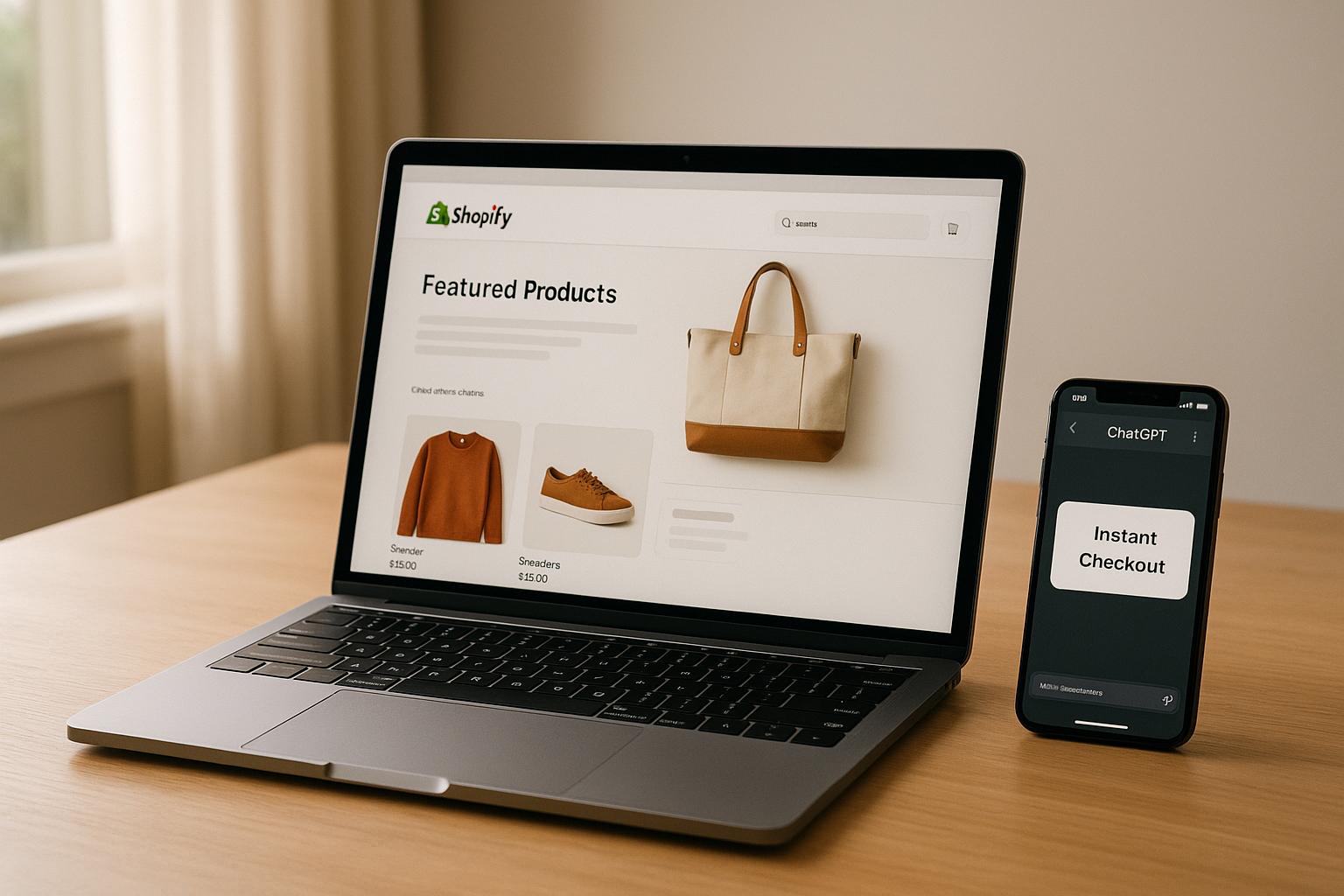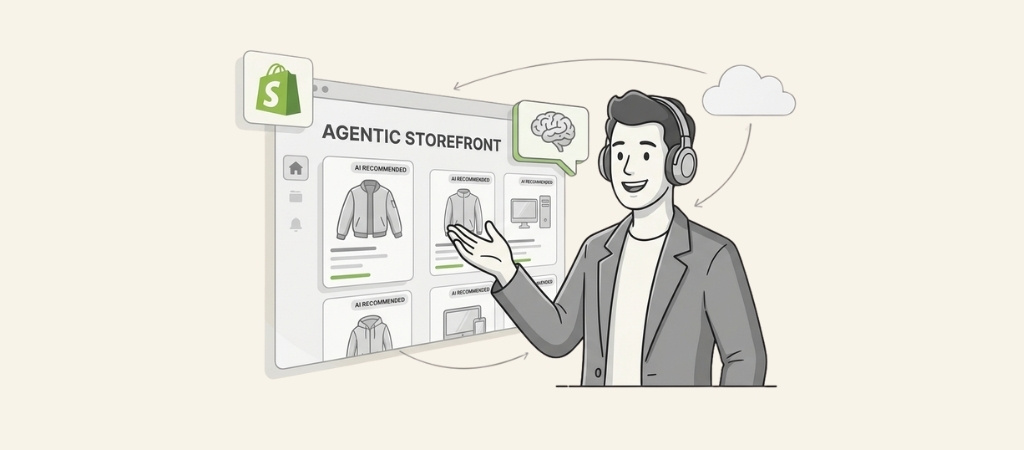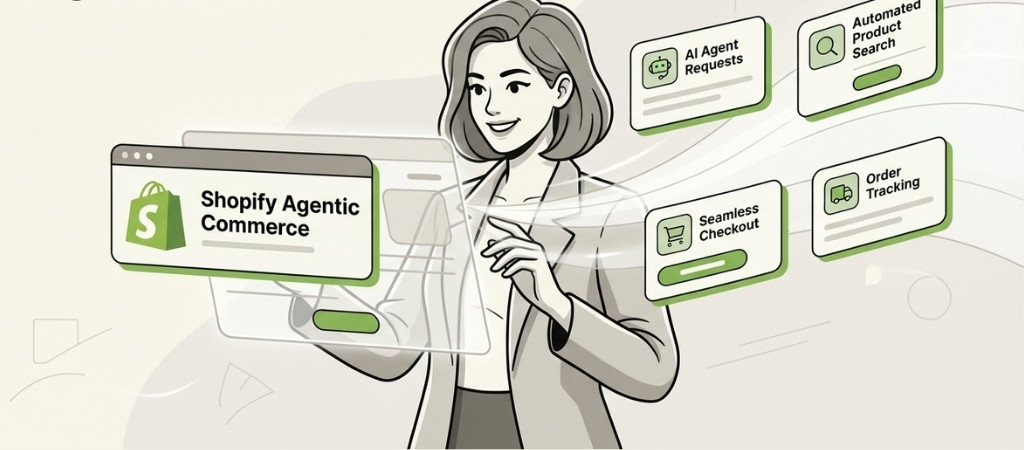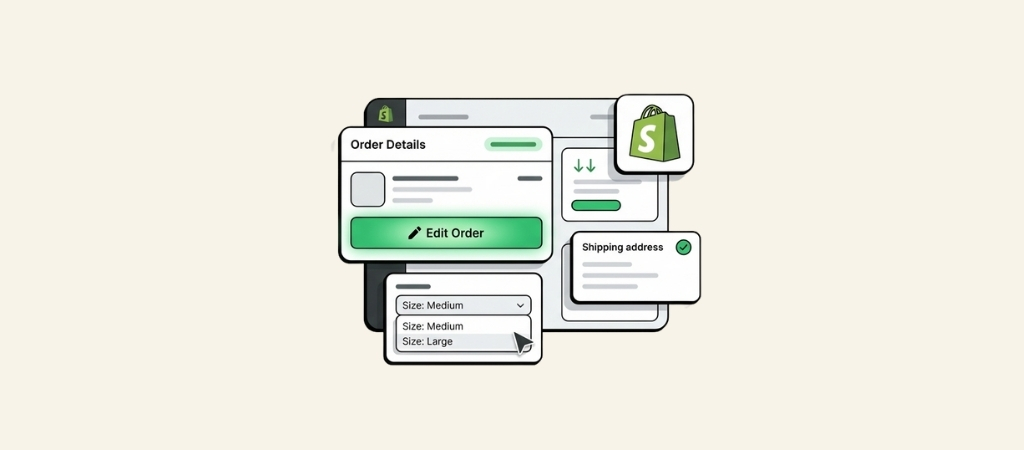Want to sell directly through ChatGPT? Shopify and Stripe have made it possible. With the new Instant Checkout feature, powered by the Agentic Commerce Protocol (ACP), U.S.-based Shopify merchants can now connect their stores to ChatGPT, enabling customers to discover and purchase products without leaving the chat.
Here’s what you need to know:
- Instant Checkout lets customers complete purchases directly in ChatGPT, reducing friction and encouraging impulse buys.
- The integration uses Stripe for secure payments via a Shared Payment Token (SPT). Shopify merchants with Stripe can activate this with minimal setup.
- Product recommendations in ChatGPT are organic, meaning relevance - not ad spend - determines visibility.
- Setup involves enabling ACP in Shopify, optimizing product data, and testing the Instant Checkout experience.
To prepare:
- Ensure your Shopify store is U.S.-based, on a paid plan, and integrated with Stripe.
- Update product descriptions with clear, natural language for better ChatGPT discovery.
- Test the entire process, from product recommendations to checkout, to ensure smooth functionality.
This new feature opens access to ChatGPT’s 700 million weekly users, offering a powerful new sales channel. Keep reading for a detailed setup guide and tips to optimize your store for AI-driven commerce.
Shopify x ChatGPT: OpenAI Instant Checkout Just Transformed E-Commerce

Requirements for ChatGPT Integration Setup
To begin selling through ChatGPT conversations, your Shopify store must meet specific business and technical criteria. Many established U.S.-based merchants are already equipped to fulfill these requirements.
Business and Technical Requirements
Your Shopify store needs to be U.S.-based, on an active paid Shopify plan, and you must have admin privileges to make necessary configurations. Additionally, your store should already have products listed, payment gateways set up, and shipping options ready to go. While Instant Checkout is currently rolling out for U.S. Etsy sellers, over a million Shopify merchants in the U.S. are expected to gain access "soon".
For payment processing, ensure your Stripe integration is updated. You can either perform a simple code update or use Stripe's Shared Payment Token API or Delegated Payments Spec through the Agentic Commerce Protocol without changing your current payment processor.
Your backend must securely handle encrypted payment tokens and include fraud monitoring. The integration seamlessly works with your existing order management, payment processing, and fulfillment systems, transforming ChatGPT into an additional sales channel.
It's also crucial to comply with U.S. data privacy laws, such as the California Consumer Privacy Act (CCPA). During transactions, the integration only shares the information needed to complete orders, and this happens with explicit user consent.
To connect your store with ChatGPT, implement the Agentic Commerce Protocol (ACP) using publicly available documentation. ACP serves as the framework for enabling AI agents and businesses to collaborate on purchases.
"The Agentic Commerce Protocol is an open standard for AI commerce that lets AI agents, people, and businesses work together to complete purchases." - OpenAI
Once your store meets these requirements, you can move forward with configuring API access for ChatGPT integration.
Beta Program Access and API Setup
As ChatGPT integration continues to evolve, Shopify is simplifying the API setup process to allow for more customization. Shopify has partnered with OpenAI to enable direct selling through ChatGPT conversations. According to Shopify CEO Tobi Lütke, the rollout is happening "very very soon". This means eligible Shopify stores won't need to join a specific beta program, as the functionality will be automatically enabled.
"Rollout is coming very very soon." - Tobi Lütke, Shopify CEO
Shopify takes care of most of the technical complexities, allowing merchants to focus on growing their business while the backend requirements are managed.
If you want to create custom ChatGPT features, you'll need direct access to OpenAI's API. Start by creating an account on OpenAI's platform and generating an API key from their dashboard. Be sure to keep this key secure on your backend and never expose it in frontend code.
"For security, never expose your API key in frontend code and always keep it secure on your backend." - Aurora Hoang, LitExtension
For custom app development, you'll need to enable it in your Shopify Plus admin panel and obtain the required Shopify API credentials.
Merchants interested in Instant Checkout but not automatically eligible through Shopify can apply directly through OpenAI. This process is separate from general API access and is specifically for enabling product sales through ChatGPT conversations.
Step-by-Step Setup Guide
Here's how to connect your Shopify store with ChatGPT using Stripe's Agentic Commerce Protocol. This integration creates a smooth shopping experience by linking your Shopify store with ChatGPT's buying capabilities.
Connect Shopify to Stripe
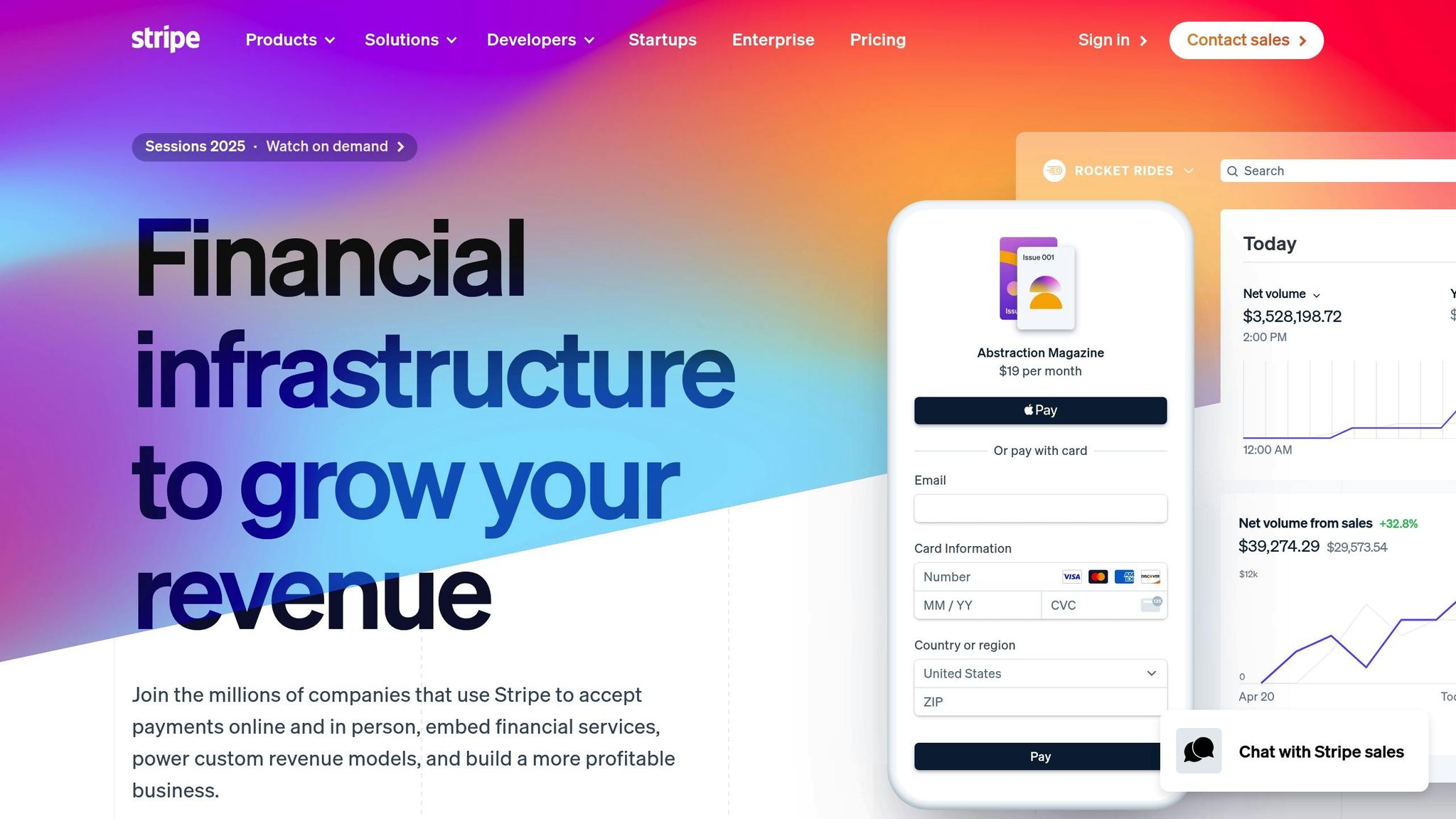
If your Shopify store already uses Stripe for payment processing, enabling agentic payments can be as simple as updating one line of code.
For merchants using a different payment processor, you can still integrate by using Stripe's Shared Payment Token API or implementing the Delegated Payments Spec within the Agentic Commerce Protocol. This allows you to use Stripe specifically for ChatGPT transactions while continuing to rely on your primary payment processor for regular sales on your website.
The easiest option? Wait for Shopify's official solution. Experts anticipate Shopify will soon release a "ChatGPT sales channel" app in the Shopify App Store.
"Industry chatter and early reports point to OpenAI possibly releasing an official 'ChatGPT sales channel' app in the Shopify App Store." - Greg Shuey, Founder and CEO, Stryde
Once this app becomes available, setting it up will be as straightforward as installing any other Shopify app and following the setup wizard. Once Stripe is connected, you’ll need to enable ACP in your Shopify admin.
Enable Agentic Commerce Protocol (ACP)
The Agentic Commerce Protocol acts as the link between your Shopify store and ChatGPT's shopping features. Shopify merchants enjoy a streamlined process since they’re automatically eligible for ACP integration.
Most Shopify store owners can activate the ChatGPT checkout feature directly in their Shopify admin settings. Look for the toggle switch under the sales channels or integrations section. Turning it on will enroll your store in ChatGPT's Instant Checkout program.
"Merchants can typically enable the Shopify ChatGPT checkout feature within their Shopify admin settings, often just by turning it on." - eesel AI
You’ll remain the merchant of record, maintaining full control over your products, pricing, transaction processing, and order fulfillment. ChatGPT simply becomes an additional sales channel, much like selling on social media platforms or online marketplaces.
Set Up Products for ChatGPT Discovery
Once your technical integration is complete, it’s time to optimize your product data for ChatGPT. Unlike traditional SEO, ChatGPT relies on conversational understanding, so your product information must be clear and natural.
ChatGPT pulls product data from various sources, including Shopify's APIs, structured website data, and product feeds submitted to platforms like Google Shopping. While your Shopify integration handles the API connection, optimizing your product data ensures better visibility.
Here’s how to make your products stand out:
- Use natural, descriptive language in product titles and descriptions. For example, instead of "Men's Blue Cotton T-Shirt XL", try "Comfortable Blue Cotton T-Shirt for Men - Extra Large, Ideal for Everyday Wear."
- Highlight benefits and use cases in your descriptions. Explain what makes the product special, who it’s for, and how it’s typically used. This helps ChatGPT recommend your products more effectively when users ask questions like "What’s a good gift for someone who loves hiking?"
- Include high-quality images. Use sharp, square images (700x700 pixels or larger) with clean backgrounds, along with lifestyle photos showing the product in action.
- Ensure your product pages load quickly and are mobile-friendly. Many ChatGPT users browse on their phones, so a smooth mobile experience can improve conversions.
- Add Schema markup to your product pages using JSON-LD format. Include details like pricing, availability, brand, ratings, and reviews. This structured data helps AI systems better understand your products and improves their presentation in ChatGPT conversations.
Test Your Integration
Before promoting your ChatGPT integration to customers, thoroughly test the entire process to ensure everything runs smoothly. Start by asking ChatGPT about products similar to yours to check if they appear in its recommendations.
Try specific queries like, "What’s a good birthday gift for a teenage girl?" or "What’s the best budget-friendly laptop for students?" Pay attention to how your products are described and whether they show up in the results.
Once your products are visible, test the Instant Checkout process from start to finish. Add items to your cart, proceed through checkout, and verify that taxes are calculated correctly for different states. Check that shipping options and estimated delivery dates align with your actual fulfillment capabilities.
Review how your refund and return policies are displayed during checkout. Clear policies build trust and minimize post-purchase issues.
Finally, monitor your order management system to ensure ChatGPT orders integrate seamlessly with your existing workflow. Confirm that inventory updates correctly, notifications for new orders are received, and everything aligns with your current processes.
If you encounter any issues, double-check your Stripe integration settings and ensure your product data meets all formatting requirements. Most problems stem from incomplete product information or minor payment configuration errors, which can usually be fixed through your Shopify admin panel.
Optimize Your Store for ChatGPT Sales
Getting your products noticed in ChatGPT requires a fresh approach compared to traditional SEO. ChatGPT prioritizes user intent and structured data when selecting products. To stand out in this new shopping environment, you’ll need to fine-tune your store’s setup and adopt strategies that align with ChatGPT’s unique way of presenting products. Here’s how you can make it work.
Product Listing Best Practices
ChatGPT simplifies product titles and descriptions for its users, often rephrasing your original content. However, the information you provide still plays a critical role in shaping how your products are presented.
When crafting your listings, think conversationally. Use natural, buyer-focused language that reflects how people actually talk about your products. Instead of cramming in keywords, focus on clear, measurable benefits. For instance, instead of saying "long-lasting", be specific: "lasts up to 5 years" or "cuts energy costs by 30%". Highlight customer needs with phrases like "perfect for remote workers", "affordable starter kit", or "top choice for sensitive skin". And don’t forget - format your pricing to match U.S. standards (e.g., $19.99).
To ensure ChatGPT understands your products better, use detailed schema markup in JSON-LD format. Include information like product details, pricing, availability, brand, ratings, and reviews. If you create blog-style product roundups, add ItemList structured data to help ChatGPT identify relationships between items.
External validation is another key factor. Unlike traditional SEO, where backlinks dominate, ChatGPT values mentions on trusted platforms. Work to get your products featured in "best of" lists, participate in relevant Reddit conversations, and collaborate with respected bloggers and affiliates. Bring this validation directly to your product pages by including expert quotes, media mentions, or snippets of customer reviews.
Once your listings are optimized, make sure your inventory systems and customer service are ready to handle the demands of ChatGPT-driven shoppers.
Manage Inventory and Orders in Real-Time
ChatGPT encourages immediate purchases, so keeping your inventory data accurate and up to date is crucial. Users expect real-time information about product availability. Since you remain the merchant of record for transactions, your systems need to handle the complexities of selling across multiple channels seamlessly.
Shopify’s unified inventory management can help by syncing stock levels across all your sales channels automatically. This prevents situations where ChatGPT recommends items that are already out of stock, saving you from customer dissatisfaction. Unified inventory systems also reduce manual work and help avoid stock discrepancies.
"We go through constant inventory fluctuations and shifting demands. It was hard to reliably and accurately represent which stores had certain items in stock to our digital customers when they wanted to try something on." – Guillaume Jaillet, Chief Omnichannel Officer, Oak + Fort
Set up automated reorder points using Shopify Flow to ensure you’re notified when inventory dips below a safe threshold. This is especially important during busy seasons or after successful marketing campaigns that drive unexpected traffic from ChatGPT recommendations.
For an even more precise system, consider advanced tools. In 2025, Rebecca Minkoff achieved 99% accuracy in inventory tracking by using RFID tags that automatically updated their system upon product arrival - a significant improvement over manual methods. Apps like Stocky, Thrive by Shopventory, or ShipHero can also enhance tracking and forecasting for businesses with more complex needs.
Meet U.S. Customer Expectations
After optimizing your listings, delivering top-notch customer service is the final step to fully integrating with ChatGPT. American shoppers have high expectations for service, return policies, and communication - factors that become even more critical when they discover your products via ChatGPT.
Make sure your return and shipping policies are clearly displayed. ChatGPT users often land directly on product pages or checkout, so this information needs to be easy to find. Keep in mind that a single poor experience can drive 32% of customers away from a brand they love.
Your customer service team should be available during U.S. business hours, typically 9 AM to 6 PM across different time zones. While ChatGPT operates 24/7, offering human support during these hours ensures you’re there when customers need help most. For after-hours inquiries, ChatGPT-powered chatbots can step in, but always provide a clear path to escalate complex issues to human agents.
Personalization is key. With 71% of customers expecting tailored experiences, use ChatGPT’s capabilities to recommend products based on individual preferences.
Transparency is equally important. Keep customers informed with proactive updates about order status, shipping delays, or site maintenance. Brands that excel in customer experience can even charge up to 16% more for their products.
While ChatGPT can drive discovery and recommendations, your Shopify store still needs to deliver an exceptional shopping experience from start to finish. This combination of optimization, real-time inventory management, and outstanding customer service will set your store apart.
Improve Post-Purchase Support with Ringly.io
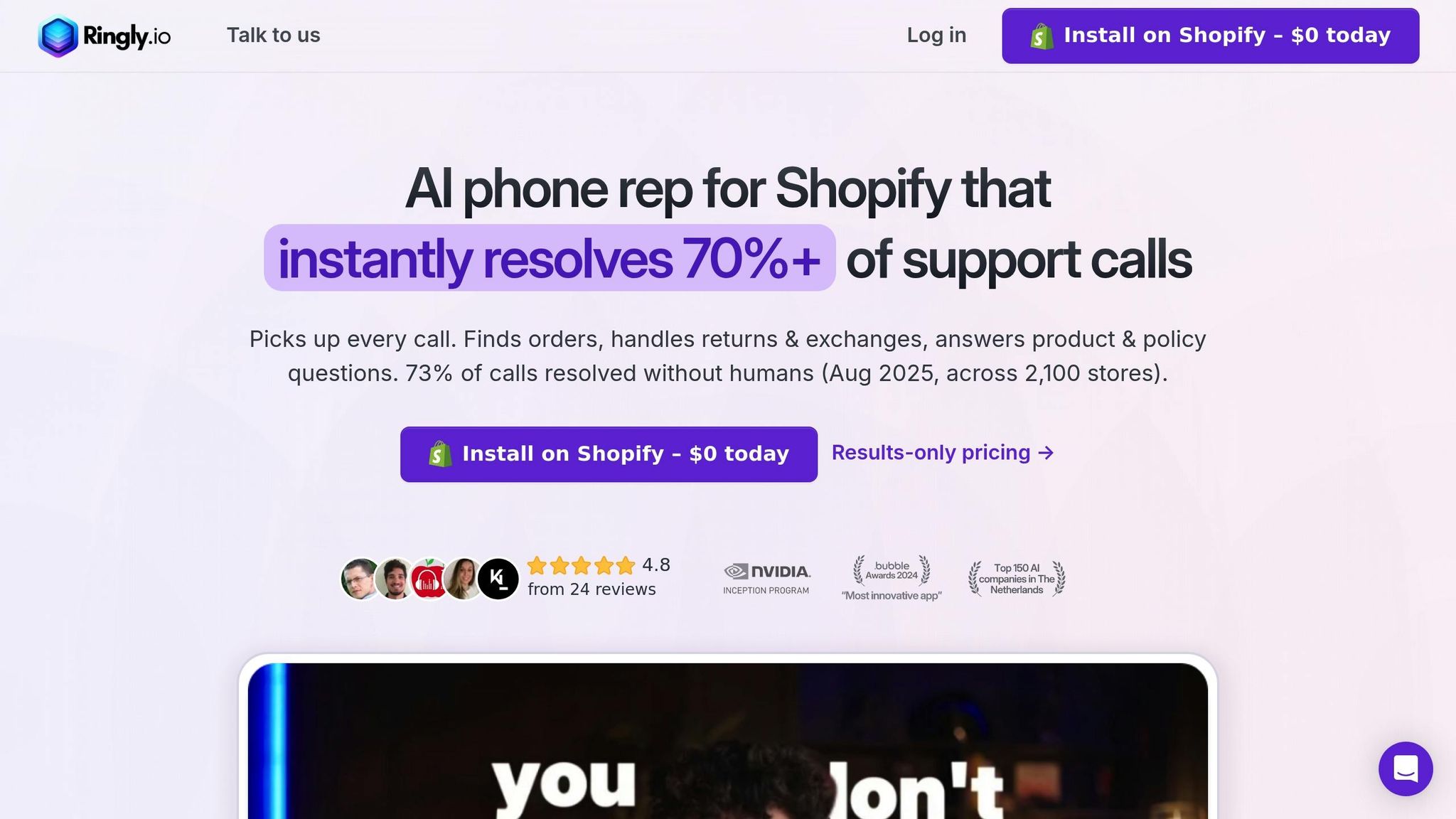
Once customers find your products through ChatGPT and make their purchases, the next step is just as important: delivering top-notch post-purchase support. This is where customer loyalty is built, and Ringly.io’s AI phone agent, Seth, steps in to make a difference. Designed to handle post-purchase support effortlessly, Seth not only ensures satisfied customers but also uncovers opportunities to boost revenue.
Automate Customer Support Tasks
Seth is available 24/7, taking on routine post-purchase tasks so your team can focus on more complex issues. In August 2025, Seth achieved an impressive 73% resolution rate across 2,100 Shopify stores, proving its ability to handle customer concerns effectively.
Here’s what Seth can do for your business:
- Check order statuses instantly using your Shopify database.
- Send tracking updates via SMS.
- Answer product-related questions using your store’s knowledge base.
- Process returns and exchanges, including generating labels and issuing refunds.
"Ringly.io is an AI phone rep built to automate customer support for Shopify stores. It picks up every call, answering questions, finds order statuses, creates returns and exchanges. In aug 2025, Ringly's AI phone rep resolved 73% of calls across 2100 stores. All without humans doing a thing." – Ringly.io
Beyond efficiency, Seth offers significant cost savings. It handles calls at just $0.38 each, compared to $2.35 for human agents - an 83% reduction in support costs. This cost-effectiveness is especially valuable during high-traffic periods when scalable support is critical. With support for 30 languages, Seth ensures seamless communication for both local and international customers. And when issues become too complex, Seth can detect frustration or repeated failed attempts and transfer the call to a human agent.
Create Upselling and Cross-Selling Opportunities
Great customer support isn’t just about solving problems - it’s also a chance to drive sales. Seth uses its understanding of caller history and your product catalog to recommend complementary items or upgrades during support calls. It can even make outbound calls to recover abandoned carts. Whether a customer is checking on their order or exploring new options after a ChatGPT-driven purchase, Seth is ready to suggest products that match their preferences.
Use Analytics to Improve Support Performance
Ringly.io doesn’t just automate support - it helps you make it better. Every call is recorded and analyzed, giving you insights into customer satisfaction, call durations, and recurring issues. This data can highlight areas for improvement, like refining product information or streamlining shipping and return processes.
With its analytics dashboard, you can track key performance metrics such as resolution rates, escalation trends, and customer satisfaction. For enterprise users on the Scale plan, advanced features like continuous AI optimization and mood detection provide even deeper insights, helping to flag frustrated customers for immediate attention. Businesses using Ringly.io often report an average ROI of 5.9x.
Ringly.io offers flexible pricing to suit your needs. The Grow plan starts at $349 per month for 1,000 call minutes, with a results-based model that begins billing only after Seth resolves 60% of 100 calls within 21 days. Plus, a 14-day free trial lets you test Seth’s capabilities with real customer interactions before committing.
Key Takeaways
The integration of Shopify stores with ChatGPT marks a notable shift in e-commerce, as AI agents begin to act as personal shoppers.
New Opportunities with ChatGPT Integration
The connection between ChatGPT and Shopify, facilitated by Stripe's Agentic Commerce Protocol, opens up exciting possibilities for U.S. merchants. ChatGPT offers access to a vast audience already using the platform for everyday tasks, including product searches. This creates a fresh sales channel for your store. Unlike traditional advertising, ChatGPT’s product recommendations are unsponsored and based purely on the relevance of user queries.
One standout feature is Instant Checkout, which allows customers to complete their purchases directly within ChatGPT.
Merchants also retain full control over key aspects like customer relationships, pricing, fulfillment, and returns. Thanks to the Agentic Commerce Protocol, orders integrate seamlessly into existing backend systems, ensuring minimal disruption for businesses already operating on Shopify.
These advancements build on the integration steps discussed earlier, making it easier than ever for merchants to tap into this AI-driven opportunity.
Prepare Your E-commerce Business for the Future
While the immediate benefits of this integration are clear, long-term planning is equally important. AI adoption is becoming essential for staying competitive, with recent data revealing that 50% of Shopify merchants plan to use AI for content, 33% for marketing, and only 22% for customer service - a potential area to differentiate your business.
AI marketing tools are now critical for driving sales, improving efficiency, and tailoring customer experiences.
"AI marketing tools are no longer a luxury, they're essential for Shopify merchants aiming to grow sales, boost efficiency, and personalize the customer experience."
The e-commerce landscape is evolving from traditional browsing and clicking to AI-led interactions. Major brands like Steve Madden are already preparing for this transformation. Colleen Waters, VP of eCommerce at Steve Madden, highlights the importance of this shift:
"AI will fundamentally reshape how our customers shop. Being on Shopify means we can automatically be wherever our customers are shopping - including inside AI conversations. That lets us stay focused on our brand and customers while staying at the forefront of commerce."
- Colleen Waters, VP of eCommerce, Steve Madden
To remain competitive, businesses must consistently explore new AI technologies and adopt forward-thinking strategies. Leveraging integrations like ChatGPT and AI-powered customer support tools such as Ringly.io can position your e-commerce business for success in this rapidly changing environment. With nearly a third of global consumers believing AI will enhance their shopping experience, the demand for these technologies is only set to grow.
E-commerce is moving toward an AI-driven future - act now to ensure your business stays ahead.
FAQs
How can I make my Shopify store's products more visible in ChatGPT recommendations?
To make your Shopify store's products stand out in ChatGPT recommendations, start with clear and engaging product descriptions written in natural, conversational language. This approach helps AI better grasp what you're offering and makes your listings more relatable to potential customers.
Next, use structured data like JSON-LD to provide detailed, machine-readable information about your products. This ensures AI platforms can accurately interpret your listings.
Don't overlook the importance of high-quality reviews, precise product specifications, and well-optimized product feeds for platforms like Google Shopping. These elements not only enhance how AI platforms like ChatGPT understand your products but also improve their chances of being recommended. The result? Increased visibility and more traffic to your store.
How can I prepare my Shopify store for integration with ChatGPT?
To prepare your Shopify store for ChatGPT integration, the first step is enabling API access through Shopify's Storefront and Admin APIs. These APIs let ChatGPT interact with key elements of your store, including products, orders, and customer data. Keep in mind Shopify's API rate limits, which vary by plan: standard plans typically allow 2 requests per second, while Shopify Plus supports up to 20 requests per second.
Setting up the APIs correctly is essential for smooth operation. This setup allows ChatGPT to handle tasks like offering tailored product recommendations and managing transactions effortlessly, enhancing the overall shopping experience for your customers.
How does the Agentic Commerce Protocol improve shopping in ChatGPT for customers?
The Agentic Commerce Protocol transforms the way shopping happens in ChatGPT, making it quicker and easier. With this feature, customers can explore and buy products directly within the chat, skipping the hassle of jumping to external websites. Transactions are completed in just a few steps, saving both time and effort.
This approach not only simplifies the buying process but also ensures security and smooth interactions. At the same time, businesses maintain full control over payments and how they engage with customers. It’s a fresh approach to e-commerce that benefits both shoppers and merchants alike.



